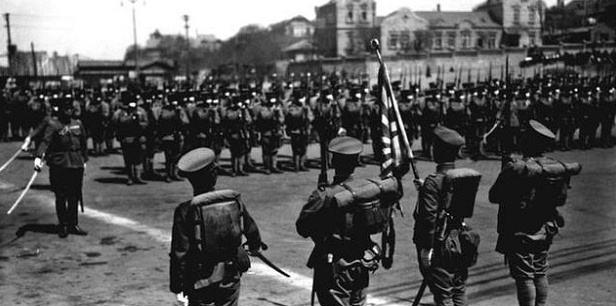During World War II, there was one of the strongest and best equipped japanese troops, which was the Kwantung Army, known as the "Flower of the Imperial Army", and the Kwantung Army numbered about 1.2 million people at its peak, because it was stationed in the "Kwantung Prefecture" in the northeast Dalian region at that time, so it was called the Kwantung Army.
When the Russo-Japanese War broke out in 1904, and the place of operation was in the northeast of china, it was like two unrelated people going to your house to fight and destroy your family's things, think about how incompetent the Qing court was at that time. Although Russia was also a great power at that time, the two sides experienced more than a year of bloody battles, and finally ended with the victory of the Japanese army.

However, the Wolf's ambitious Japanese army came but did not want to leave, and this time it was the Kwantung Army that fought the strongest and best equipped (of course, this is not called the Kwantung Army).
But it is also impossible to garrison troops in other countries, and subsequently, a garrison of Manchurian railways to protect the rights and interests of the South Manchuria Railway was formed. Under the command of the Governor of Kanto, when the Japanese army changed the control of the tohoku region to Kwantung Prefecture, so it was also called the Kwantung Army, and thus the Kwantung Army began to occupy the northeast for 40 years.
However, in order to improve the status of the Kwantung Army and the Japanese army, the Kwantung Army Headquarters was specially set up, and the soldiers transported from Japan and the mainland were preferentially selected by the Kwantung Army, including weapons and ammunition.
Over time, it naturally became the army with the strongest combat effectiveness and the best equipment, and it is worth mentioning that the Kwantung Army was directly controlled and commanded by the emperor, and its majesty and status were greatly enhanced.
However, even the strongest troops also had a day of destruction, in 1942, after the beginning of the Pacific War, due to the length of the Japanese front, they had to attack Southeast Asia, deal with the US army in the Pacific, and face the attack of the National Army, and began to show a serious shortage of troops.
For the sake of victory in the Pacific, 13 divisions were transferred to the Pacific War, and the army became a navy on the battlefield, which was very clumsy, and too many Kwantung Army had seasickness.
Coupled with this time, the Kwantung Army, facing the enemy army is a combat effectiveness, the weapons are very advanced, no doubt let the Kwantung Army become cannon fodder. In the case of the japanese army's gradual defeat and retreat, the base camp transferred 7 more divisions back to China, and also transferred a large number of military supplies back to China to prepare for a decisive battle with the enemy on the mainland.
As a result, the Kwantung Army, which had the strongest combat effectiveness and the best equipment, was scattered and its combat effectiveness was seriously reduced. When Hitler surrendered on May 8, 1945, the Soviet Union began to shift its forces to the Eastern Theater, and on August 8, the Soviet Union and Japan declared war. Subsequently, the Soviet general Vasilevsky was given 1.5 million troops to attack the Kwantung Army.
The Soviet army was very fast, and divided into several large armies at the same time to cross the Erguna River, Heilongjiang and Ussuri River, from the post-Baikal, Heilongjiang river coast and coastal areas into the northeast territory. The Soviet army severely damaged the Kwantung Army with the momentum of destruction and decay, and the former trump card was no longer mighty.
Coupled with the defeat of the Japanese army on the battlefield, the morale of the Kwantung Army was also very low, and by August 15, the last commander of the Kwantung Army, who could no longer resist the Soviet attack, surrendered to the Soviet Army. The former flower of the Imperial Army withered away, and the remaining Kwantung Army was taken prisoner and taken back to the Soviet Union.